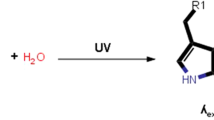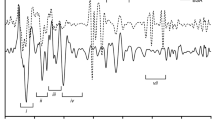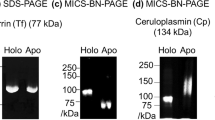Abstract
CONTINUING the study of trace substances in photographic gelatin1,2, paper electrophoresis is being used for investigating the reducing agent present. Tha main interest is in the substance(s) which react immediately with iodine.
This is a preview of subscription content, access via your institution
Access options
Subscribe to this journal
Receive 51 print issues and online access
$199.00 per year
only $3.90 per issue
Buy this article
- Purchase on Springer Link
- Instant access to full article PDF
Prices may be subject to local taxes which are calculated during checkout
Similar content being viewed by others
References
Wood, H. W., Sci. et Indust. Phot., 23, 209 (1952).
Wood, H. W., J. Phot. Sci., 2, 154 (1954).
Mapson, L. W., and Partridge, S. M., Nature, 164, 479 (1949).
von Euler, H., and Martius, C., Ann., 505, 73 (1933).
Dox, A. W., and Plaisance, G., J. Amer. Chem. Soc., 38, 2156, 2164 (1916).
Sattler, L., and Zerban, P. W., Sugar, 42, 26 (1947).
Landucci, J. M., Bull. Soc. Chim. France, 124 (1954).
Author information
Authors and Affiliations
Rights and permissions
About this article
Cite this article
WOOD, H. Paper Electrophoresis of Reducing Agents. Nature 175, 1084–1085 (1955). https://doi.org/10.1038/1751084a0
Issue Date:
DOI: https://doi.org/10.1038/1751084a0
This article is cited by
-
Beitrag zur Kenntnis des Schicksals der schwefligen Säure im tierischen Organismus
Fresenius' Zeitschrift für analytische Chemie (1968)
Comments
By submitting a comment you agree to abide by our Terms and Community Guidelines. If you find something abusive or that does not comply with our terms or guidelines please flag it as inappropriate.



